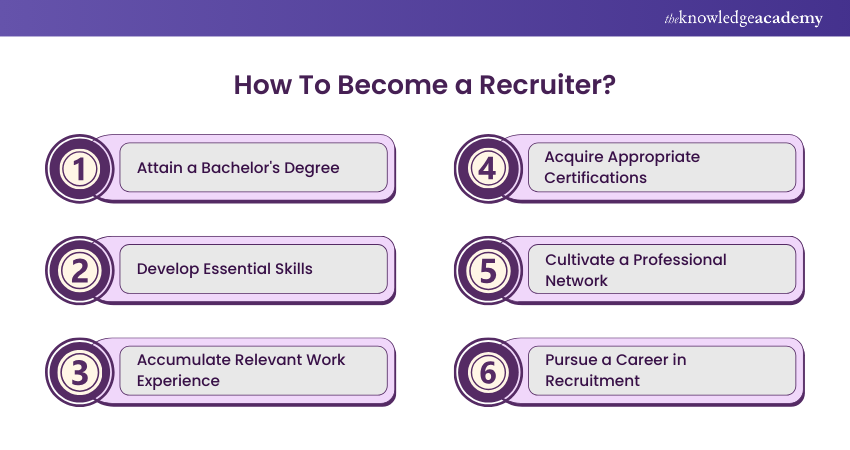We may not have the course you’re looking for. If you enquire or give us a call on +852 2592 5349 and speak to our training experts, we may still be able to help with your training requirements.
Training Outcomes Within Your Budget!
We ensure quality, budget-alignment, and timely delivery by our expert instructors.

Recruitment goes beyond merely placing the right candidate into a specific job; it is about placing the suitable talent in a suitable place to chart their career path, transform organisations. So, if ever you asked How to Become a Recruiter? You are about to embark on a wonderful journey where you are making relationship and using your ability to find the right people and connect with them.
In what we shall be presenting in this blog, we call ‘The Road Map to Recruiter Success,’ we shall be offering explanations to all the points that we are going to discuss in the subsequent steps and processes of the path in becoming a successful recruiter.
The success of the fast-growing factual of talent acquisition or simply the desire to focus on one sector of recruitment means knowing How to Become a Recruiter? is the key to unlocking the potential for recruitment in today’s fiercely competitive employment environment.
Table of Contents
1) What is a Recruiter?
2) How to Become a Recruiter?
3) Why Should you Choose Recruiting?
4) Recruiter Qualifications and Skills
5) Conclusion
What is a Recruiter?
A professional who finds, attracts, and hires talent to meet an organisation's needs and goals is known as a Recruiter. They primarily serve as an essential intermediary between employers and prospective employees. They can further guarantee a good fit for everyone involved. Recruiters use multiple techniques, such as exams, background checks, and interviews, to evaluate candidates' qualifications, experience, and cultural fit.
In addition, they are crucial in contract negotiations, hiring process facilitation and occasionally new hire onboarding. Recruiters frequently specialise in specific industries or job kinds. They can work in-house for a particular company or be a part of a Recruitment agency serving numerous clients.
How to Become a Recruiter?
Becoming a Recruiter requires you to follow certain steps. Let’s look at some of these essential steps in the following steps:

1) Attain a Bachelor's Degree
The first step towards Becoming a Recruiter is earning a bachelor's degree. Moreover, degrees in Psychology, Business Administration, or Human Resources can develop your foundation in organisational behaviour, and business operations. This educational background also helps prospective Recruiters to think critically, which is crucial for comprehending the viewpoints during the Recruitment Process.
2) Develop Essential Recruiter Skills
Recruiters must possess a specific set of skills to excel in their role. This includes strong Communication Skills, Negotiation Skills for employment terms, and organisational skills to manage various Recruitment tasks efficiently.
Additionally, developing empathy and intuition helps understand candidate motivations and cultural fit. Technical skills like proficiency in Recruitment software and social media platforms are also essential in modern Recruitment strategies. There are no recruitment-specific degrees, but research from LinkedIn revealed the most popular courses for recruiters are:
a) Psychology
b) Human resources
c) Sociology
d) Communications
e) Political science
3) Accumulate Relevant Work Experience
Gaining practical experience in Recruiting mentor-related fields like Human Resources is crucial. This can involve internships or entry-level positions where you can learn about various aspects of Recruiting.
You'll get experience in sourcing candidates, conducting interviews, and understanding legal compliance. Experience in customer service or sales roles is also beneficial. It helps develop communication and relationship management skills, which are vital in Recruiting.
4) Acquire Appropriate Certifications
The next step in learning How to Become a Recruiter is to know what and how to obtain specialised certifications. Obtaining professional certifications can enhance a Recruiter's credentials and expertise. Certifications from recognised HR organisations or registered educational institutions. These organisations can provide specialised knowledge in talent acquisition and legal aspects of Recruiting. These certifications often require ongoing education, keeping Recruiters updated on the latest trends and best practices.
Gain all essential skills to become a successful Recruiter – register now for our Recruitment Training!
5) Choose Your Specialisation
In essence, becoming a specialist proves rather useful as a recruiter in as much as it deems it pivotal to specialise in a specific industry or type of position. Whether you are targeting technology, the health care industry, the finance sector, or any other creative position, it is relevant to know and associate with the industry.
Specialising also helps you develop a great pool of talented candidates and identify where the demand is, therefore providing you with worthwhile customers. Specialising in particular fields also enables one to offer solutions to employers that are unique to the specific requirements of the employer, making you an asset in the process of hiring.
6) Cultivate a Professional Network
Connecting with Recruitment specialists is an essential step. Moreover, joining HR and Recruiting groups is all part of this. Having a strong network can also help you gain access to applicants and industry trends and progress your career. Moreover, networking develops a contact pool that is useful for finding applicants for different positions.
7) Apply for a Recruitment Job
The final step is simple when applying for a job in Recruitment. With a well-crafted cover letter and CV, you'll have the chance to showcase your Recruitment skills during the interview. To increase your chances of success, you can check out our job interview tips and make a lasting impression.
Why Should You Choose Recruiting?
Choosing a profession in Recruitment can provide you with a stable income, potential for advancement, and personal fulfilment. A job in the Recruiting industry offers a wide variety of earning potential, which is a considerable benefit. As per Glassdoor, the annual yearly earnings of a Recruiter in the United Kingdom are £37,194. In the United Kingdom, Recruiters usually receive an additional £7,425 in compensation (£3,158 - £17,458).
Although salary is a major factor, there are other reasons why Recruiting is attractive besides money. It offers a dynamic work environment to keep you intellectually stimulated. The role also involves continuous learning about industries, companies, and evolving job trends. This exposure to diverse sectors and organisational cultures enables you to broaden your knowledge base.
Boost your hiring skills with our Safer Recruitment Course! Discover effective techniques and ensure safer recruitment practices.
Recruiter Qualifications and Skills
If you're considering a career as a Recruiter, it's essential to understand the skills that contribute to success in this role. Here are some of the most important skills and qualifications for Recruiters:
1) Communication Skills
Recruiters excel in communication, enabling them to clearly convey information between employers and candidates. It's crucial to build strong relationships with clients, quickly extracting key details about the roles they need to fill and the type of candidates they're seeking.
Establishing trust and rapport with clients can lead to ongoing work and long-term partnerships.
2) Self-motivation
Recruiters are driven and disciplined, thriving on both base salary and performance-based incentives like commissions and bonuses. This motivation often provides Recruiters with the flexibility to manage their schedules and work styles, with a strong focus on achieving results rather than following rigid processes.
3) Organisational Skills
Recruiters often handle multiple priorities and clients simultaneously, making strong organisational skills essential. On any given day, you might be coordinating with several candidates and employers across different industries.
Effective time management and task prioritisation are key to meeting deadlines and keeping everything on track.
4) Sales Skills
Although not always recognised as a sales role, Recruitment is, at its core, a sales-driven profession. As a Recruiter, you sell job opportunities to candidates and candidates to employers. This requires strong sales and negotiation skills, particularly when advocating for fair salaries or advising clients on realistic compensation expectations.
Interpersonal skills are also vital in building successful relationships with both candidates and employers.
Prepare for your next interview with top Recruitment Consultant Interview Questions. Check out our latest blog for expert tips.
Conclusion
If you were curious in How to Become a Recruiter, we hope you gained some crucial insights in this blog. You can also navigate the dynamic area of Recruitment and thrive in matching talent with opportunity by obtaining a relevant degree and developing a professional network.
Transform your hiring process! Discover strategies for successful recruitment in our comprehensive Recruiting for Success Course.
Frequently Asked Questions

While there's no mandatory degree, a bachelor's in Human Resources, business, psychology, or a related field is highly beneficial. These disciplines provide essential knowledge and skills relevant to Recruitment, such as understanding organisational behaviour and effective communication.

Recruiting work can also stand to be improved by certification as these give the holder the courtesy of proving his or her level of expertise and thus increasing his or her marketability. There are some credentials such as CPRW or AIRS that show that a person knows the recruitment process, talent acquisition, and the law.

The Knowledge Academy takes global learning to new heights, offering over 30,000 online courses across 490+ locations in 220 countries. This expansive reach ensures accessibility and convenience for learners worldwide.
Alongside our diverse Online Course Catalogue, encompassing 17 major categories, we go the extra mile by providing a plethora of free educational Online Resources like News updates, Blogs, videos, webinars, and interview questions. Tailoring learning experiences further, professionals can maximise value with customisable Course Bundles of TKA.

The Knowledge Academy’s Knowledge Pass, a prepaid voucher, adds another layer of flexibility, allowing course bookings over a 12-month period. Join us on a journey where education knows no bounds.

The Knowledge Academy offers various HR Leadership Courses, including Certified HR Advisor, Certified HR Manager, and HR Management Course. These courses cater to different skill levels, providing comprehensive insights into HR Skills.
Our HR Resources Blogs cover a range of topics related to HR skills, offering valuable resources, best practices, and industry insights. Whether you are a beginner or looking to advance your HR skills, The Knowledge Academy's diverse courses and informative blogs have you covered.
Upcoming HR Resources – Learn about Human Resources Batches & Dates
Date
 Recruiting for Success Training
Recruiting for Success Training
Fri 3rd Jan 2025
Fri 28th Mar 2025
Fri 23rd May 2025
Fri 4th Jul 2025
Fri 5th Sep 2025
Fri 24th Oct 2025
Fri 5th Dec 2025







 Top Rated Course
Top Rated Course



 If you wish to make any changes to your course, please
If you wish to make any changes to your course, please


